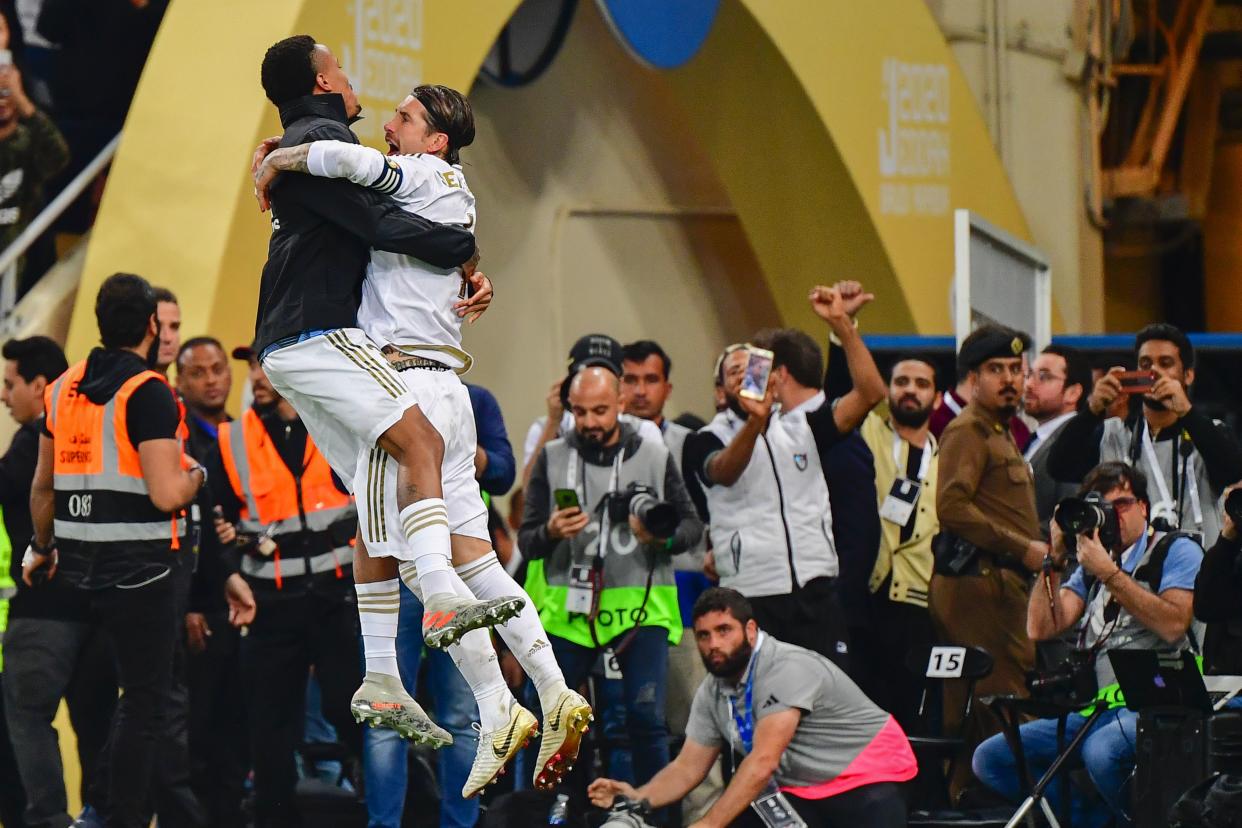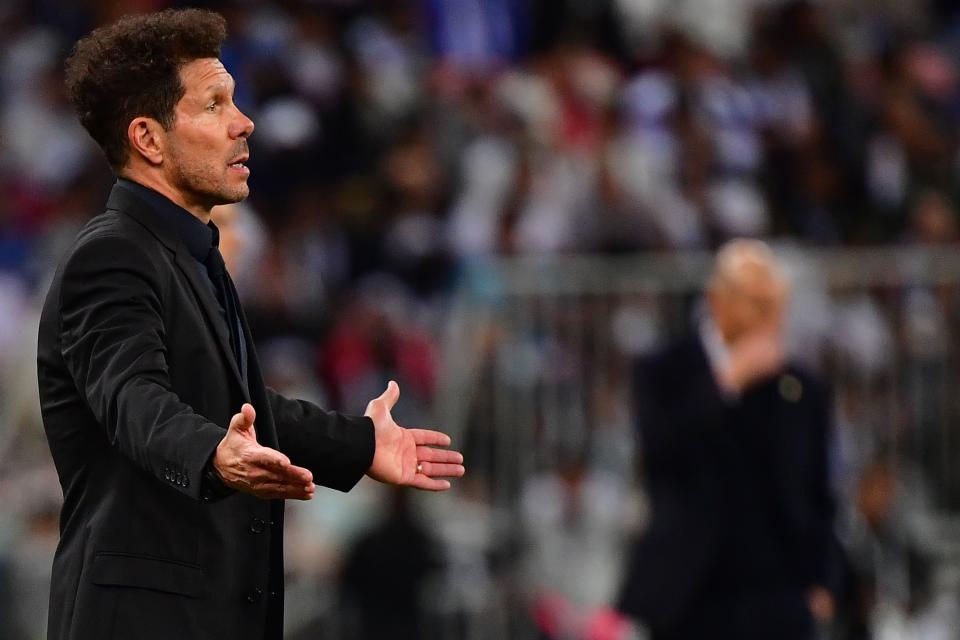Pointlessly bloated Spanish Super Cup ends with Real Madrid beating Atletico on penalties

There may well have been a more cynical game in the history of professional soccer, but it’s hard to remember one. And because the only idea soccer executives and administrators have to bring about growth and increase revenues is to put on more games, this season gave us a four-team Supercopa de Espana, finally won by Real Madrid on penalty kicks over Atletico Madrid on Sunday.
The Spanish Supercopa, as is traditional in just about every European league, pits the previous season’s domestic league and cup winners against each other for a prize that opens the new campaign in August. It’s largely ceremonial. Some teams take it seriously; some don’t. It’s usually considered the final tune-up of the preseason. A dress rehearsal.
Various leagues have taken that show on the road in an attempt to gain new fans. Italy’s Serie A has crossed the globe, coming stateside as far back as 1993 and traveling to China, Qatar and Saudi Arabia. So has France’s Ligue 1, playing it in New York City a few years ago, before a paltry crowd, and going to Canada, Tunisia, Morocco, Gabon, Austria and China.
The Supercopa de Espana has real market value though, because it very often turns into a Clasico between blood-rivals FC Barcelona and Real Madrid. Or it turns out to be a Madrid derby with Real and Atletico Madrid. Already, the Supercopa’s habit of playing two games to decide the prize in a home-and-away format felt like overkill. But what the Spanish federation has done this year by expanding it to a four-team tournament, located in Saudi Arabia, in the middle of the season, is a remarkable and callous over-reach with a game that had little value to begin with.
Last season, the Supercopa was held abroad for the first time in 34 years, in Morocco. It was staged as a single game held in mid-August. But then this year, Saudi Arabia won a bidding process against Qatar, China and India for some $133 million to host the thing as a four-team event for the next three years. In January.
Setting aside the human rights and sportswashing issues, the whole thing is a massive inconvenience. With the tournament now taking place in the middle of the season, it further jams up an already hopelessly busy club schedule – and things weren’t helped by the final going to extra time, rather than straight to penalties, for no comprehensible reason. It was also an unreasonably expensive enterprise for the fans, who were so unenthused about the prospect that, according to Marca, Atletico had sold just 50 tickets to the event a day ahead of its semifinal against Barcelona – which had sold all of 300. Valencia did even worse, peddling just 25 of them for its semi against Real, top-sellers of 700 tickets. Each team had an allotment of 12,000 tickets. The King Abdullah Stadium has a capacity of more than 62,000.
Super Cup cost for fans. Hotel: -€360. Return flight Madrid to Jeddah: -€470. Flight duration: -22 hours.
Super Cup cost for clubs. Real Madrid: +€6million. Barcelona: +€6million. Atletico: +€4million. Valencia: +€3m.— Tom Allnutt (@TomAllnuttAFP) January 6, 2020
The Spanish federation sold this mini-tournament as a savior that will help the sport in Spain on the whole. Its president claimed the old format was “doomed” because it lost money and that the new revenues will be used to support the women’s game and the second and third professional tiers, where teams structurally run deficits.
It’s lucrative for the club as well. Real and Barca were guaranteed $7.5 million to participate, not counting prize money. Atletico and Valencia got less and were understandably dismayed.
But even so, this wasn’t an event the clubs were keen on, no matter what they were paid.
“The football we’re involved with is an industry,” Barca manager Ernesto Valverde said before the 3-2 semifinal loss to Atletico, per AS. “The search for sources of income is why we’re here.
“It’s always been the first title of the season between the champions of La Liga and the champions of the Copa del Rey,” Valverde continued. “I think it was fine as it was. … From the sporting point of view, there’s only one league champion. And only one cup winner.”

It was probably inevitable that Spain’s league and federation would eventually get their way. After all, they had been trying to export competitive games for some time now. La Liga has attempted on several occasions to put regular season games in Miami, thereby setting a precedent for auctioning off domestic matches to the highest foreign bidder.
In a sporting sense, this inaugural tournament was a mixed bag. By holding it midseason, the soccer was far more charged and crisp than a glorified preseason finale. The Atletico-Barca semi was a rollicking affair. And Real flexed its muscle in a 3-1 win over Valencia.
There have been real ramifications for Valderde, meanwhile, whose seat is hotter than ever after the loss, facing blistering criticism after a defeat nobody would have thought twice about in the old format. Barca is now reportedly attempting to hire former stars Xavi or Ronald Koeman for his job. And the game obviously meant a lot to his Atletico counterpart Diego Simeone.
But then the final was mostly a bore, long on square balls and short on chances. The best looks didn’t come until after the hour, when Real’s Federico Valverde managed to knock his wide-open header from Luka Jovic’s cross into his own knee and well wide of goal. His teammate Rodrygo had a chance in injury time while Atletico’s Alvaro Morata was denied point-blank by Thibaut Courtois.
Things finally became watchable in the second half of extra-time, when Courtois denied Morata again on a flying scissor-kick. And in the other goal, Jan Oblak made a stunning double-save on shots from Luka Modric and Mariano as the game turned sloppy. In the 115th minute, Valverde chopped down the runaway Morata and was sent off. But Real and Courtois managed to preserve the 0-0 stalemate with 10 men to send the whole affair to penalties.
From the spot, Real prevailed 4-1.
And at last Saudi Arabia had gotten the show it had paid so dearly for, to the detriment of so many others.
Leander Schaerlaeckens is a Yahoo Sports soccer columnist and a sports communication lecturer at Marist College. Follow him on Twitter @LeanderAlphabet.
More from Yahoo Sports:


